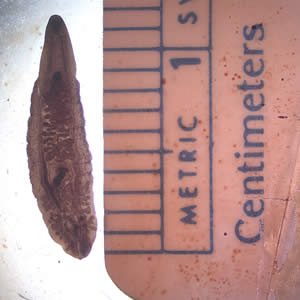Public Health
Bile Duct Cancer (Cholangiocarcinoma) and Liver Fluke Infection

Liver Fluke Photo credit: CDC
Bile duct cancer (cholangiocarcinoma) is a cancer of the biliary duct system, which includes the gallbladder, bile ducts, and certain cells inside the liver. It is a rare cancer but becomes more common as people grow older.
Key risk factors for bile duct cancer are:
- Primary sclerosing cholangitis
- Chronic ulcerative colitis
- Cysts in the bile ducts
- Cirrhosis of the liver
- Hepatitis B or C virus
- Diabetes
- Obesity
- Genetic factors
Another risk factor for bile duct cancer is past infection with tiny parasitic worms called liver flukes, which are found in the fresh waters of Southeast Asia. People can become infected by eating raw or under-cooked fish that have these parasites. Once eaten, the liver flukes grow to adulthood inside the human biliary duct system. The irritation and scarring caused by liver fluke infection can lead to bile duct cancer.
Two parasites are commonly involved. One is Opisthorchis verrini, which is found in Southeast Asian countries, including Thailand, Lao People's Democratic Republic, Vietnam, and Cambodia. The other is Clonorchis sinensis, which is common in rural areas of Korea and China. The Centers for Disease Control and Prevention (CDC) has additional information on liver flukes.
Veterans who ate raw or undercooked freshwater fish during their service in Southeast Asia, such as Vietnam War Veterans, might have been infected. However, currently VA is not aware of any studies that show that bile duct cancer occurs more often in U.S. Vietnam War Veterans than in other groups of people.
Symptoms of bile duct cancer
Symptoms of bile duct cancer include jaundice (yellowing of the skin and the whites of the eyes), pain in the abdomen, dark urine, light or ‘clay’ colored stool, fever, itchy skin, nausea and vomiting, and unexplained weight loss. If you are concerned about bile duct cancer, please talk to your health care provider.
Tests for bile duct cancer
Your health care provider uses medical history, physical examination, and may employ a variety of blood tests and medical imaging (Xrays, CT, MRI scans, and/or ultrasound) and consultation with specialists to diagnose bile duct cancer.
Tests for liver fluke infection
Your health care provider can arrange for examination of your stool to check for ongoing liver fluke infection. If the infection occurred years ago, the test may not show the presence of liver flukes. Currently, there is no test of previous (resolved) liver fluke infection available for clinical use in the United States.
Health concerns?
Contact your health care provider at your local VA Medical Center to get more information about military exposures and health, or your VA Environmental Health Coordinator to connect you to a health care provider.
Health care and benefits
VA offers a variety of health care benefits to eligible Veterans. Not enrolled in the VA health care system? Find out if you qualify for VA health care.
Find out about VA benefits for which you may be eligible.
Sources
American Cancer Society What Are the Risk Factors for Bile Duct Cancer?National Cancer Institute Liver and Bile Duct Cancer –Patient VersionTyson, El-Serag. Risk factors for cholangiocarcinoma. Hepatology 2011; 54: 173-84.
Sripa B, Kaewkes S, Sithithaworn P, et. al. Liver Fluke Induces Cholangiocarcinoma. PLoS Med 2007; 4: e201.




















